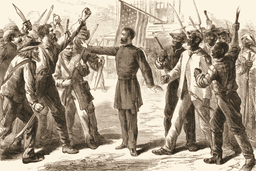Feel free to use or edit a copy
includes Teacher and Student dashboards
Measure skillsfrom any curriculum
Measure skills
from any curriculum
Tag the questions with any skills you have. Your dashboard will track each student's mastery of each skill.
With a free account, teachers can
- edit the questions
- save a copy for later
- start a class game
- automatically assign follow-up activities based on students’ scores
- assign as homework
- share a link with colleagues
- print as a bubble sheet
6 questions
Show answers
- Q1The Thirteenth Amendment did what?Abolished all slaveryOfficially ended the Civil War in 1865Abolished slavery and servitude except as punishment for crimeProvided Equal Protection under the law for all citizens300s
- Q2The goal of Jim Crow Laws was to...Work alongside Reconstruction efforts in Virginia, Texas, and KentuckyProvide equality for freed blacks living in the South after the Civil WarLimit social, economic, and political gains of black people in the SouthGradually unite blacks and whites across the United States over a period of 20 years300s
- Q3Which of the following legalized Jim Crow Laws across the U.S.?Plessy v. FergusonThe 14th AmendmentThe Emancipation ProclamationThe Surrender at Appomattox300s
- Q4Sharecropping resembled slavery because...Black sharecroppers could not leave the farmsBlack farmers were violently attacked by land ownersIt did not resemble slavery at allThe economic debt required for sharecropping limited the sharecropper's freedom300s
- Q5Which of the following is true about Reconstruction?It was ultimately successful after the course of 30 yearsThe Southerners made every effort to prevent black success in the North after the Civil WarIt was a time of peace and prosperity for all Americans, especially womenThe North used its power after the Civil War to create a better society for freed black people in the South300s
- Q6In reality, the 15th Amendment granted...Black men and women the right to vote, but they were often prevented by Jim Crow LawsEqual Protection for all Americans, especially black people in the SouthFreed black people in the South a plot of land and a few farm animals after the Civil WarBlack men the right to vote, but they were often prevented by Jim Crow Laws300s
